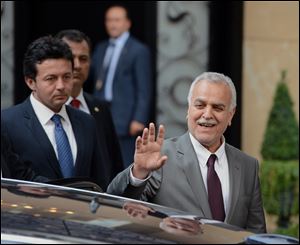
Iraqi Sunni VP convicted of running death squads rejects verdict
9/10/2012
Tariq al-Hashemi, right, was found guilty of murdering a lawyer and a security official.
BAGHDAD — Iraq's fugitive Sunni vice president on Monday declared his "absolute innocence" in a terror trial that had sentenced him to death on charges of masterminding the murder of rivals, and rejected the conviction against him as a politically motivated sham.
Tariq al-Hashemi, who fled Iraq after the government brought charges against him, said he will not return to appeal the verdict unless he can be assured of a fair day in court.
Speaking from his exile in Turkey, al-Hashemi said a fair trial would be impossible in Baghdad and accused Prime Minister Nouri al-Maliki — a Shiite and the vice president's longtime foe — of manipulating the courts against him as part of a political vendetta.
"The verdict is unjust, politicized, illegitimate and I will not recognize it," al-Hashemi told reporters in the Turkish capital, Ankara. "But I put it as a medal of honor on my chest because it was al-Maliki, not anyone else, behind it. I'm proud that it is al-Maliki, and not anyone else, to target me."
"The death sentence is a price I have to pay due to my love for my country and my loyalty to my people," he added. "I reiterate that I'm innocent, and am ready to stand before a fair judicial system and not a corrupt one that is under al-Maliki's influence."
Asked directly if he will return to Baghdad within 30 days to seek a retrial, as is his right under Iraqi law, al-Hashemi said: "I'm not going, regardless of the time scale that has been offered to me."
Spokesmen for al-Maliki and the Iraqi government could not immediately be reached for comment Monday.
Al-Hashemi fled to Turkey after Iraq's Shiite-led government issued the terror charges against him in December, the day after U.S. troops withdrew from the country. He would receive a retrial if he agrees to return to Baghdad, but al-Hashemi has refused, saying he will never get a fair hearing in a Baghdad court.
The politically charged case sparked a government crisis and fueled Sunni Muslim and Kurdish resentment against al-Maliki, whom critics say is monopolizing power.
On Sunday, Baghdad's criminal court convicted al-Hashemi and his son-in-law, Ahmed Qahtan, of organizing the murders of a Shiite security official and a lawyer who had refused to help the vice president's allies in terror cases. In a third case, the two defendants were acquitted of the killing of a security officer due to a lack of evidence.
The charges were the first against al-Hashemi to go to trial among the government's allegations that he played a role in 150 bombings, assassinations and other attacks from 2005 to 2011 — years in which the country was mired in sectarian violence that followed the 2003 U.S.-led invasion that ousted Saddam Hussein's Sunni regime. Most of the attacks were allegedly carried out by al-Hashemi's bodyguards and other employees, and largely targeted government officials, security forces and Shiite pilgrims.
The Baghdad court sentenced both al-Hashemi and Qahtan in absentia to death. They have 30 days to appeal the verdict and could win a retrial if they return to Iraq to face the charges.
Sunday's verdict was announced as Iraq reeled from a daylong pounding of bombings and shootings that left 92 people dead and more than 360 wounded in nearly two dozen attacks across the country. On Monday, in a statement posted on a militant website, al-Qaida's branch in Iraq claimed responsibility for the wave of violence and vowed there will be more "black days ahead."
Most of the court evidence against al-Hashemi came from 10 of his former bodyguards who testified they were ordered by Qahtan, and then paid, to carry out killings in small groups. Qahtan managed al-Hashemi's vice presidential office.
Al-Hashemi has long accused the government of torturing the bodyguards into giving false statements. His defense team did not offer any witnesses or testimony during the trial's ten hearings.
Al-Hashemi — who has been in office since 2006 — is on Interpol's most-wanted list, but Turkey has shown no interest in sending the vice president back to Baghdad, straining diplomacy between the two neighboring nations.
Al-Hashemi appeared defiantly upbeat at the packed press conference. "I am not worried about my life," he said. "I am worried about the future of my country."